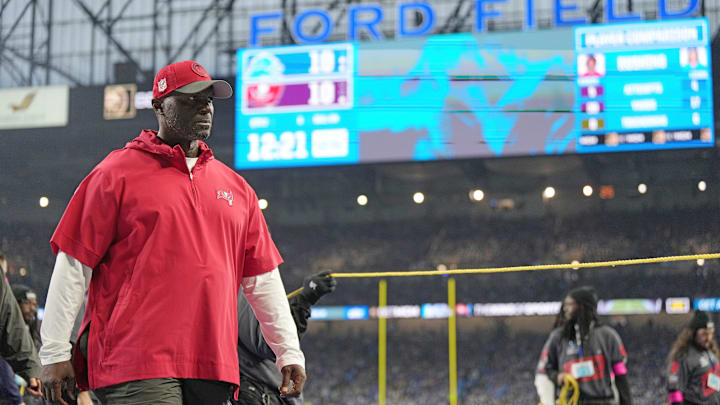Of course the Tampa Bay Buccaneers season ends with a coaching controversy that has re-ignited angst over the decision-making of Todd Bowles.
Tampa Bay's season came to an end on Sunday in Detroit, albeit a lot later in the year than anyone thought it would. The Bucs were playing with house money in the NFC Divisional Round, as their season had already been deemed a success based on how they turned things around and improved not only after what happened last year but what happened midseason.
After falling into a 1-6 slump, the Bucs picked themselves up off the mat and went on a four game winning streak to save the season. A lot of the credit is due to head coach Todd Bowles, who learned from past mistakes and found a way to keep his locker room motivated anf focused.
That's why the lingering fallout from Sunday's loss stings so bad, because it feels like a step backward.
Bowles is being heavily criticized for choosing to not call a timeout after the Lions took a knee on third down with 0:36 seconds on the clock. Had Bowles called his final timeout, the argument is that the Lions would have either had to try a long field goal or punt the ball back with plenty of time on the clock for a potential miracle drive.
Instead, Bowles let the clock run out and the Lions dance into the Championship game.
Should Todd Bowles have called his final timeout against Lions?
The short answer is: yes.
It reeks of loser mentality to do anything other than try to win the game while there's still time on the clock, especially in the playoffs. Tampa Bay was playing with house money, but that's no excuse to wave the white flag.
What kind of message does that send?
Optics are also at play here; one constant frustration for fans all year was watching Bowles collect timeouts like rare stamps.
Against the Falcons, he chose to not spend any time outs and chase points after his defense forced a huge turnover -- the Bucs lost by three. A few days later in Buffalo, he tried to hard count on a field goal attempt before halftime, but rather than calling a timeout took a delay of game penalty and punted -- the Bucs lost by less than a touchdown.
Clock management has been a massive flaw for Bowles going back to last year, when he didn't use any timeouts against the Browns to allow Tom Brady to try and get points before halftime in a game Tampa Bay lost by less than a score.
Notice a theme here?
The long answer is, however, a little more complicated. While the Herm Edwards you play to win the game rule felt like it should have been in full effect, it's important to note that at no point in the final two minutes of the game did Lions' win probability drop below 99.8 percent.
Of course, that algorithm didn't have to factor in the Bucs getting the ball back, but it's notable nonetheless.
Analytics seemed to play a heavy role in the decision-making late in the loss to Detroit. Tampa Bay went for two after scoring to come within eight points of the Lions, a conversion that would have meant the Bucs could win with a touchdown. Bowles got dragged for making that decision too, despite how that sort of aggression was something fans had been wanting to see out of him.
That's the counterweight to the timeout controversy, though. Why would Bowles be aggressive on the two point conversion only to fold when another opportunity presented itself? Lest we forget, even though the odds were long the Bucs came within inches of Chris Godwin catching a Hail Mary against the Bills, so there's no saying a similar situation couldn't have played out with plenty of time on the clock.
Then again, a lot of this argument is leaving out a pretty major factor. Detroit was at Tampa Bay's 30-yard line, which would have put them in a position to attempt a 47-yard field goal, a distance from which Michael Badgley hadn't missed all year.
Had the Lions made the kick it would have been an 11-point game.
That being said, you never know what can happen. Badgley hadn't missed from that distance but is only a career 77 percent kicker beyond 40 yards, and there's always a chance the kick is blocked and possibly returned for a touchdown.
It was a long shot, but seemingly throwing in the towel with a chance to win a playoff game -- especially after the season the Bucs had -- is a brutal way to end things.
